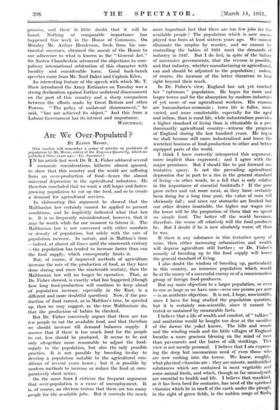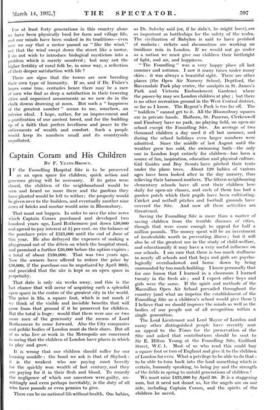Are We Over-Populated ?
EY ELDON MOORE.
[Our readers will remember a series of articles on problems of population by Mr. Moore, editor of the Eurnies Quarterly, which we published three years ago.—En. Spectator.] N his article last week Dr. R. A. Fisher adduced several economic considerations, hitherto almost ignored, to show that- this country and the world are suffering from an over-production of food—hence the almost universal depression in the agricultural industries. He therefore concluded that we want a still larger and faster- growing population to eat up the food, and so to create a demand for agricultural services.
In elaborating this argument he showed that the Malthusian law certainly cannot be applied to present conditions, and he implicitly indicated what that law is. It is so frequently misunderstood, however, that it may be worth while for one moment to labour it. The Malthusian law is not concerned with either numbers or density of population, but solely with the rate of population increase. In nature, and in Malthus's time —indeed, at almost all times until the nineteenth century —the population has tended to increase faster than can the food supply, which consequently limits it.
But, of course, if improved methods of agriculture increase the rate of the production of food, as they have done during and since the nineteenth century, then the Malthusian law will no longer be operative. That, as Dr. Fisher showed, is exactly what has happened (though how long food-production will continue to keep ahead of population increase, especially in the East, is a different and more doubtful question). Now, if the pro- duction of food cannot, as in Malthus's time, be speeded up, then we may suggest, as the true Malthusians do, that the production of babies be checked.
But Dr; Fisher conversely argues that there are too few people to eat the available food, and that therefore we should increase till demand balances supply. I answer that if there is too much food for the people to eat, less should be produced. It seems to be not only altogether more reasonable to adjust the food- supply to the population, but also the only possible practice. It is not possible by breeding to-day to develop a population suitable to the agricultural con- ditions of several years hence ; but it is possible by modern methods to increase or reduce the food at com- paratively short notice.
On the same lines I criticize the frequent argument that over-population is a cause of unemployment. It is, of course, an obvious truism that there are too many neoule for the available jobs. But it conceals the much more important fact that there are too few jobs for the available people ! The population which is now unem- ployed was born at least sixteen years ago. We cannot eliminate the surplus by murder, and we cannot by controlling the babies of 1931 meet the demands of industry in 1947. But I do feel, in spite of the failure of successive governments,- that the reverse is possible, and that industry, whether manufacturing or agricultural, can and should be adjusted to the population.; unless, of course, the increase of the latter threatens to leap right beyond their reach.
In Dr. Fisher's view, England has not yet reached her " optimum " population. He hopes for more and larger towns and for the absorption by modern industries of yet more of our agricultural workers. His reasons are humanitarian-economic ; town life is fuller, more varied, and more comfortable, especially for the aged and infirm, than is rural life, while industrialism provides a higher standard of living than is obtainable in a pre- dominantly agricultural country—witness the progress of England during the last hundred years. He hops we shall become still more industrialized and leave the wretched business of food-production to other and better equipped parts of the world.
I think I have correctly interpreted this argument, more implicit than expressed ; and I agree with the major premisses. But I should like to put forward one tentative query. Is not the prevailing agricultural depression due in part to a rise in the general standard of living—in other words, to a fall that is only relative in the importance of essential foodstuffs ? If the poor grow richer and eat more meat, as they have certainly been doing for a long time past, the value of corn will obviously fall ; and since our stomachs are limited but our other desires insatiable, the higher our wages rise the lower will be the proportion of them that we spend on simple food. The better off the world becomes, therefore, the worse off relatively will the food-producer be. But I doubt if he is now absolutely worse off than he was.
If there is any substance in this tentative query of mine, then either increasing urbanization and wealth will depress agriculture still further ; or Dr. Fisher's remedy of breeding up to the food supply will lower the general standard of living.
I also doubt the wisdom of breeding up, particularly in this country, an immense population which would be at the mercy of a successful enemy or of a conscienceless group of foreign food-producers.
But my main objection to a larger population, or even to one as large as we have now—over one person per acre —is an aesthetic objection.. It is not, I hope, unscientific, since I have for long studied the population question, but it is certainly non-scientific, since it cannot be tested or sustained by measurable facts.
I believe that a life of wealth and comfort, of " talkies " and sanitation would be bought too dear at the sacrifice of the dawns the yokel knows. The hills and woods and the winding roads and the little, villages of England breathe a more gracious blessing on the mind of man than pavements and the lustre of silk stockings. This view is not merely personal. I believe that I am express- ing the deep but unconscious need of even those who are now rushing into the towns. We know, roughly, what physical vitamins are : they are minute, unidentified substances which are contained in most vegetable and some animal foods, and which, though so far unanalysed, are essential to health and life. I believe that mankind, as it has been bred for centuries, has need of the spiritual vitamins which lie in smell of the earth under the plough, in the sight of green fields, in the sudden songs of birds; For at least forty generations in this country alone we have been physically bred for farm and village life, and our minds have been soaked in its traditions—even now we say that a motor passed us " like -the wind," not that the wind swept down the street like a motor. I do not wish to introduce biological mysticism into a problem which- is merely unsolved ; but may not the higher fertility of rural, folk be, in some way, a reflection of their deeper satisfaction with life ?
There are signs that the towns- are now breeding their own type of humanity. If so, and if Dr. Fisher's hopes come- true, centuries hence there may be a race of men who find as deep a satisfaction in their towering cities and organized amusements as we now do in the chalk downS drowsing at noon. But such a " happiness of the greatest number " seems to me, somehow, an inferior _ ideal. I hope, rather, for an improvement and a purification of our ancient breed, and for the building up of a faith that prefers loveliness and peace to the enticements of wealth and comfort. Such a people would keep its numbers small and its countryside unpolluted.
























































 Previous page
Previous page